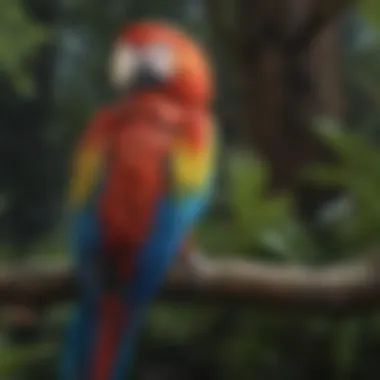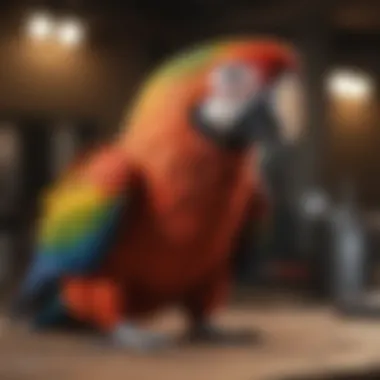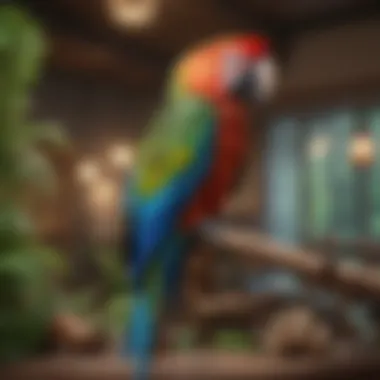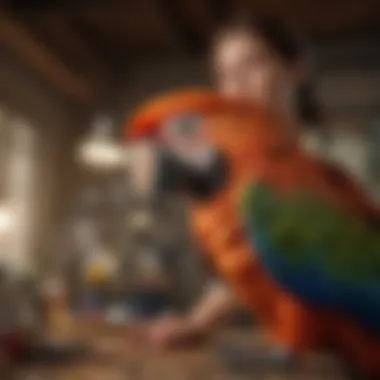Understanding the Costs of Macaw Ownership


Intro
Owning a macaw can be one of the most rewarding experiences for bird enthusiasts and pet lovers alike. However, with such joy comes significant financial responsibility. It's not merely a matter of buying a colorful companion; the true costs unfold over time, unveiling layers of investment in care and maintenance that prospective owners must recognize.
In this article, we will unpack the financial landscape of macaw ownership. From initial purchase prices to ongoing expenses like diet, healthcare, and living conditions, we aim to offer a clear picture of what one can expect when welcoming a macaw into their home. We'll delve into detailed analyses of grooming techniques, health strategies, and practical training that not only enhance the relationship with these magnificent birds but also mitigate long-term costs.
By the end, whether you're just starting your journey or have been involved in aviculture for years, this guide seeks to empower you with knowledge, paving the way for responsible and informed decision-making around macaw companionship.
Preface to Macaw Ownership
Owning a macaw can be as delightful as it is demanding. This introduction sets the stage for anyone considering bringing one of these vibrant creatures into their home. Macaws aren’t just pets; they’re intelligent, social beings that thrive on interaction and care.
Understanding the commitment and responsibilities involved in caring for a macaw is of paramount importance. Prospective owners must consider not only the initial costs of purchase but also the ongoing financial commitments that come with providing a enriching environment. Their unique needs run deep and require careful thought.
The Appeal of Macaws as Pets
There’s a magnetic allure to macaws, known for their stunning plumage and engaging personalities. These birds are not just delightful to look at; they possess a remarkable ability to bond with their caregivers. Owning a macaw often feels like sharing your life with a vibrant personality wrapped in feathers.
However, that appeal comes with significant responsibilities. Their charm can easily mask the complex needs they have, from social interaction to a well-rounded diet. Awareness of these needs is key for anyone who might consider macaw ownership.
Understanding Macaw Species
Delving into the world of macaws requires an understanding of the different species available, as their particular needs and traits can vary significantly. Both novice and seasoned bird enthusiasts benefit from recognizing these distinctions.
Common Macaw Types
Among macaw enthusiasts, some species stand out due to their striking appearance and captivating behaviors. The Blue and Gold Macaw, for instance, is a crowd-favorite, admired for its vivid colors and engaging disposition. This species often proves to be a fantastic choice for first-time macaw owners, thanks to its relatively sociable temperament.
While the Green-Winged Macaw is notable for its larger size and striking red wings, it's equally important to consider your living situation. Its larger cage requirements and potential mess levels might not suit every household.
In the end, many choose a macaw type based on both aesthetic charm and compatibility with their lifestyle. Careful consideration of one’s living environment and the macaw’s needs is essential for a harmonious companionship.
Differences in Care Needs
The variety of macaw species also brings different care requirements. For example, the Scarlet Macaw, known for its remarkable intelligence, might engage in more demanding interactions compared to its less active cousins. This means potential owners should be prepared for mentally stimulating activities to keep their feathered friend from becoming bored.
A key takeaway here is understanding that while one species might fit perfectly into your lifestyle, another may require much more attention and care. Each species has a unique personality and quirks that can influence how they should be cared for, which could ultimately impact your decision to own a macaw.
"A macaw is like a unique piece of art; it not only needs a frame but also the right wall to hang on."
Before diving into ownership, consider how these factors play into your lifestyle. Every little piece of knowledge helps in ensuring that this vibrant presence enriches your life rather than complicates it.
Initial Purchase Costs
Purchasing a macaw is not just a simple transaction; it is an investment that has far-reaching implications in terms of both finances and commitment. This section will delve into the initial purchase costs associated with bringing a macaw into your home. Understanding these costs is essential for any prospective owner because they can greatly influence long-term financial planning and overall enjoyment of macaw companionship.
Price Range for Different Species
Factors Influencing Price
The price of a macaw can vary dramatically based on several factors. Firstly, species plays a paramount role. For instance, a Blue-and-Yellow Macaw might cost several thousand dollars, while a Green-Winged Macaw can be on the higher end. Geographic location also affects pricing; birds in urban centers often command higher prices than those in less populated areas due to demand and availability. Another key characteristic is the age of the bird—the younger they are, the more expensive they tend to be, especially for species that might start breeding around three to four years old. The unique feature of these prices lies in their reflectiveness of the breeding and rearing quality, which influences the overall health and temperament of the bird. Investing in a pricier bird from reputable sources can lead to fewer veterinary costs down the line, thereby justifying the initial outlay.
Vendor Type Comparison


Where you choose to buy a macaw can have a significant impact on the price you pay. Breeders tend to offer birds that are hand-raised and, therefore, may have better temperaments. This characteristic can be a decisive factor for many; no one wants a pet that bites or stays hidden all day! However, sometimes breeders can set lofty prices due to their expertise and careful breeding practices. Pet stores, on the other hand, often have lower prices, but the birds may not have been socialized as well, potentially leading to behavioral issues. One unique aspect is that pet stores may have promotions or financing options; yet their lower prices can sometimes mask underlying concerns like the health of the bird or quality of care 🙁.
Where to Buy a Macaw
Breeders vs. Pet Stores
When contemplating where to obtain your feathered friend, the debate often arises—should you buy from a breeder or a pet store? Breeders are typically knowledgeable about the specific species they raise, and as such, can provide invaluable insights into the bird’s needs, behavior, and long-term health. This expertise can come with a higher price tag, yet many see it as an fair trade-off for the reliability and support from knowledgeable sources. Pet stores, conversely, might offer a broader selection and possibly lower prices, yet they often lack dedicated staff who can provide the comprehensive advice necessary for macaw care. It is a mixed bag of benefits and drawbacks that needs careful deliberation.
Rescue Organizations and Their Fees
An often-overlooked avenue for acquiring a macaw is through rescue organizations. These groups are dedicated to giving birds a second chance at life, and the fees are usually lower compared to breeders or pet stores. Supporting a rescue not only helps a bird in need but may also come with the added benefit of receiving a bird that has been socialized and pre-vetted for health concerns. One unique character of these organizations is that many will conduct interviews or home checks to ensure that the bird goes to a suitable environment, fostering responsible ownership practices. However, the drawback can be complicated; often, the specific bird you might want isn't guaranteed to be available, and the application process can be lengthy.
"While the initial purchase price of a macaw may vary significantly, understanding the factors influencing this cost ensures a well-rounded decision in your journey toward macaw ownership."
The financial implications of these initial choices resonate deeply, impacting not only your wallet but your relationship with your macaw. Ultimately, whether you choose to buy from a breeder, pet store, or rescue organization, knowing what drives these prices can help you make the most informed decision.
Ongoing Expenses of Macaw Care
Owning a macaw is not just a fleeting fancy; it’s a long-term commitment that comes with a variety of ongoing expenses. These costs can quietly sneak up on prospective owners if they are not prepared. Understanding the financial responsibilities involved in daily feeding, housing, healthcare, and grooming is crucial for any potential macaw owner. After all, these beautiful birds require much more than initial investment. Thus, when contemplating macaw companionship, it's vital to consider every element of their care across the years.
Feeding and Nutrition
Cost of High-Quality Pellets
When it comes to feeding macaws, investing in high-quality pellets is like putting premium fuel in your car. The cost of these pellets can vary, but high-quality brands are generally priced higher due to their superior nutritional value. These pellets are designed to give your bird a balanced diet, which is key to their overall health.
The key characteristic of high-quality pellets is their formulation, often packed with essential vitamins and minerals. This aspect ensures that your feathered friend receives a well-rounded diet. Many bird owners find that using these pellets often leads to happier, healthier birds, rather than those that are fed lower-quality alternatives. The unique feature here is that high-quality pellets simplify feeding routines; they are easy to store and serve, greatly reducing the fuss. However, the downside could be their cost— cheaper options might tempt some, but the value in higher-quality brands is difficult to ignore.
Fruits, Vegetables, and Treats
Beyond pellets, macaws thrive on fruits and vegetables. These foods offer not only flavor variety but also essential nutrients that pellets might not fully provide. The cost can fluctuate based on seasonal availability and organic choices.
Fruits and vegetables serve as a colorful and visually appealing part of the diet, keeping the birds engaged while eating. This is crucial, as macaws are intelligent creatures that require stimulation. One unique feature of providing fresh produce is the interactive element; preparing their meals can forge bonds between pet and owner. On the flip side, maintaining a supply of fresh foods can become costly and requires diligent planning. Some owners may find themselves spending more on fresh food than on pellets, particularly if they choose organic options.
Housing and Accessories
Cage Prices and Specifications
The cage is where a macaw spends a big chunk of its life; hence, investing in the right one is vital. Cage prices can vary widely based on size and material quality. It’s important to consider the specs carefully; a durable cage will often save you money in the long run.
A key characteristic of a good macaw cage is its size—macaws require ample space to move around and stretch their wings. Without adequate room, a macaw can become lethargic and stressed. Unique features like removable trays for easy cleaning or wider bar spacing for climbing should also be considered. While it might be tempting to buy a cheaper, smaller cage, doing so can lead to significant issues down the road, including health problems.
Essential Accessories: Perches, Toys, and More
Accessories are must-haves in a macaw’s environment. Essentials like perches and toys not only keep the bird occupied but also cater to its natural behaviors. The costs can add up, especially if you’re looking for quality items that are free from harmful chemicals.
The key characteristic of these accessories is that they encourage physical and mental activity. Well-constructed perches can support their talons better, mitigating the risk of foot problems. Toys, especially those designed for beaking and chewing, are vital for their mental stimulation. However, high-quality toys often come at a premium, and regularly replacing these items can feel hefty.
Healthcare Needs
Routine Vet Visits and Vaccinations
Healthcare is an ongoing necessity for your feathered companion. Regular vet visits are crucial for monitoring health conditions that can easily go unnoticed. The costs associated with these vet appointments typically include routine check-ups and any required vaccinations.
A pivotal character of these visits is preventive care. Catching an issue early can save a bird’s life and cut future expenses significantly. However, veterinary fees can be quite steep depending on location and the vet’s experience. Ensuring your macaw is healthy will also save you from unexpected treatment costs that can arise when issues are ignored.


Common Health Issues and Treatment Costs
Just like any other pets, macaws can face a variety of health issues. Conditions such as feather plucking or respiratory problems are not uncommon. Costs related to treatment can become quite substantial, depending on severity and duration of the treatment plan.
It is essential to recognize that specific breeds might be more susceptible to certain conditions, which can make financial planning tricky. An important factor is understanding potential treatment options available—some may be costly but effective. While some can be treated with simple medications, others may require ongoing treatment or even specialized care, leading to financial strain over time.
Grooming and Maintenance
Beak and Nail Care
Regular maintenance is vital in owning a macaw, particularly regarding beak and nail care. Neglecting these can cause serious discomfort for your bird. The cost for grooming supplies might seem small initially, but regular professional grooming can add up.
The key aspect of beak and nail care is that it's not only about aesthetics; it's crucial for health. Well-maintained beaks prevent feeding issues, while trimmed nails prevent injury to the bird and its owners. There are choices between doing it yourself or employing a professional, each with its own set of costs.
Feather Care and Molting
Feathers are a macaw's pride and joy, yet they require effective care, especially during molting seasons. Acquiring oils and supplements can help maintain feather quality, but the costs can escalate if not well-managed.
The unique feature of feather care involves stimulating the natural molting process. Understanding the signs of molting and providing adequate nutrition and environment can ease this transition. However, failure to address care properly can lead to disheveled feathers, which reflect on your bird’s health and well-being.
In summary, understanding the ongoing expenses associated with macaw care lays the groundwork for responsible pet ownership. Every bit of knowledge about their feeding, housing, healthcare, and grooming needs contributes to the overall enrichment of both the owner and macaw's life.
Additional Costs to Consider
When welcoming a macaw into your home, it's easy to get bogged down in the immediate costs—what you pay upfront and the ongoing bills. However, overlooking the additional costs can lead to a rude awakening down the line. This section aims to shine a light on these often-forgotten expenses, ensuring that potential macaw owners are fully informed about what it truly means to adopt one of these vibrant companions.
Insurance for Exotic Pets
Owning a macaw is quite a commitment, and incorporating insurance into your planning can act as a safety net for unforeseen circumstances.
Types of Coverage
In the world of exotic pet ownership, insurance is not just a perk; it can be a lifesaver. There are multiple types of coverage available tailored specifically for exotic pets like macaws. This could include accident coverage, which sends financial help your way if your bird gets into a tussle with something sharp (or something even sharper, like a dog!), and wellness coverage, which helps cover routine vet visits and vaccinations.
A standout characteristic of these policies is the option of emergency services. Picture this: it’s late at night, and your macaw is suddenly in distress. Specialized insurance often provides support for those emergency situations, potentially covering costs incurred in a veterinary emergency room. However, it’s important to read the fine print—some insurance policies might have exclusions or might not cover certain species.
Another factor to weigh is that while these policies add a few bucks to your monthly budget, the peace of mind offered can outweigh any premium you pay.
Evaluating Insurance Needs
Understanding insurance needs is crucial in aspects of macaw ownership planning. Every bird is different, and so are their health risks and needs. Evaluating what you might need based on your macaw's age, species, and general health forms the bedrock of deciding whether insurance is worthwhile for you.
A significant characteristic of this process is the personalization aspect. Some owners might opt for comprehensive coverage, while others with older birds might prefer limited coverage due to lower instances of illness. However, as birds age, their susceptibility to health conditions can increase, making it practical to reassess what your policy should cover over time.
Many find that they often underestimate potential healthcare costs. Being prepared, if something unexpected arises, can be crucial.
Travel and Boarding Expenses
Life can often take you on unexpected journeys, and when it comes to macaw ownership, planning for the what-ifs in travel is just as important as other costs.
Transporting Your Macaw
Heading out on a trip? Transporting your macaw isn’t as simple as tossing them in the backseat. Proper travel involves a safe, spacious carrier and, importantly, familiarity for your feathered friend. Moreover, the added cost of an appropriate carrier can’t be easily dismissed. These often range from specialized soft-sided carriers to sturdy travel cages, designed to keep your macaw secure during transit.
The unique feature here is that some carriers are not just functional; they also come with extras like cozy pads or water bowls, making them a home away from home for your bird. Ensuring that you choose a carrier that adheres to airline regulations, if flying, is also vital. Thus, the expenses pile up on travel just like packing your own suitcase!


Finding Suitable Care When Away
When you're not around, securing proper care for your macaw becomes a necessity. You might find a friend or family member, or even consider hiring a professional pet sitter who specializes in exotic pets. Depending on your location and the level of care required, rates can swing significantly.
What’s commonly overlooked is the need for a trial run before leaving your macaw for an extended period. This can help you gauge how the sitter interacts with your macaw and how comfortable your bird is with them. The unique element here is that macaws are social creatures; the right care can often make a world of difference in their behavior during your absence.
Overall, it's best to plan ahead for travel and boarding as an integral part of owning a macaw. Proper preparations will surely save a headache (not to mention, expenses) later on.
Long-term Financial Commitment
Owning a macaw is a journey that stretches far beyond the initial excitement of bringing one into your home. It’s crucial to grasp the long-term financial implications that come with macaw ownership. These birds typically live for several decades, often reaching 50 years or more, which means a serious commitment to both time and resources.
Understanding this commitment is pivotal since many pet owners might underestimate ongoing expenses. Macaws require not only food, shelter, and healthcare but also consistent social interaction and mental stimulation. Each of these aspects comes with its own price tag.
Life Expectancy and Considerations
As mentioned before, macaws are long-lived pets. This life expectancy serves as a double-edged sword. On one hand, it means a lasting companionship, while on the other, it calls for an enduring financial and emotional investment. When bringing a macaw into your life, think about the following factors:
- Arranging for Their Future: Have plans for their care in case life circumstances change.
- Financial Stability: Ensure that your earnings can support them not just today but many years down the road.
- Estate Planning: Think about who will care for your macaw after you.
"A macaw's long life can be a blessing, but also a responsibility that requires planning."
Planning for Aging Macaws
Macaws age much like humans, and their care needs can shift over time. Planning for this change is essential.
Adapting Care as They Age
As macaws enter their elder years, they may develop specific health issues or require adjustments to their environment. This adaptability can include:
- Diet Adjustments: Older macaws might need softer foods or supplements to aid digestion.
- Comfortable Housing: Perhaps a cage that allows easier access if they become less mobile.
- Frequent Vet Check-ups: Regular visits may reveal early signs of age-related issues.
Emphasizing adaptability can lead to a more comfortable life for your feathered friend. The key characteristic of adapting care hinges on the belief that aging doesn't mean decreased quality of life. In fact, by investing a bit more thought and planning into their care, you can actually extend their happiness.
Potential Increased Costs
Aging comes with its own set of financial implications. Elderly macaws often require more healthcare resources. Specific points to consider:
- Routine Veterinary Care: Increased frequency of vet visits becomes a reality.
- Specialized Diets: You may need to invest in higher-quality, specialized food catered to their health issues.
- Therapeutic Treatments: These can include physical therapy or medications that might not have been necessary when they were younger.
The potential costs may seem daunting, but being prepared mitigates the shock. Understanding the aging process allows owners to budget effectively and maintain a fulfilling pet-owner relationship. It’s about planning to ensure that your macaw lives its golden years in comfort, rather than just managing costs as they come.
Finale: Assessing Financial Readiness
Owning a macaw is a significant commitment that goes well beyond the initial excitement of welcoming these vibrant creatures into your home. It requires careful thought concerning the financial implications involved in their long-term care. Without a doubt, understanding your financial readiness is paramount. This part of the article guides you through evaluating your budget and aligning it with the responsibilities of macaw ownership. It's about more than just having sufficient funds—it’s about planning for their well-being.
Evaluating Your Budget
Assessing your budget isn’t just a math exercise; it’s a deep dive into your financial landscape. It includes everything from daily expenses to unexpected costs. When you decide to take on a macaw, remember that their needs can fluctuate based on a variety of factors.
- Initial Purchase Costs: These can set you back anywhere from $1,000 to $3,000, depending on the species and breeder.
- Ongoing Care: Monthly expenses related to food, housing, and healthcare compound the total costs. Consider setting aside a portion of your income specifically for your macaw’s upkeep. It’s wise to budget at least $100 per month for food and materials.
- Emergencies: Always keep an emergency fund. Any creature can fall sick, and veterinary expenses can soar—sometimes in excess of $500 for serious health issues.
"Planning for financial matters isn’t just about avoiding stress—it’s about creating a safe and stable environment for your feathered companion."
Making an Informed Decision
After you’ve done your homework regarding costs, the next step is ensuring you are making a well-informed decision. Macaw ownership should never be taken lightly or rushed into without a solid understanding of what it entails.
- Comparative Research: Don’t just consider your current financial situation; think about future changes as well. Could your income increase or decrease over the next few years? Are there unforeseen expenses that could pop up?
- Resource Exploration: Look into various communities for pet owners, like forums on reddit.com or groups on facebook.com, where you can learn from the experiences of others. The insights of seasoned macaw owners can provide a clearer picture of what to expect.
- Long-term Commitment: Remember, macaws often live 50 years or more. What might seem manageable today could become more challenging down the road. Thus, making an informed decision is not only wise but necessary for both you and the macaw.
Facilitating a successful partnership with a macaw hinges on financial readiness. Understanding what it truly costs—from the upfront purchase to the unforeseen expenses in the years ahead—ensures that you can provide for their needs while enjoying their remarkable companionship.







